

The new agriculture and developing emerging farmers: Ha... Photo by Ryan Searle on Unsplash In any process of change there will be forces that push change in radical and truly transformative directions, and there will be forces that do change things but are in fact regressive, and inadvertently or covertly reaffirm current patterns and processes.
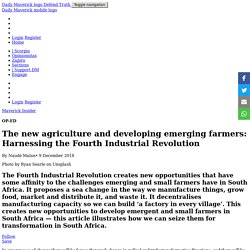
To develop small and other emerging farmers in South Africa, we have to take seriously their position in a modern economy, the inequities in society, and the need for truly transformative structural change to the economy and systemic change to the food system. Emerging and small farmers often lack economies of scale. Their production prospects are negatively influenced by insufficient access to land, which in turn affects their access to credit, technology and other resources. Lower production volumes translate to lower bargaining power with large buyers, and the ability to compete for a better price. To “develop” emerging small farmers in South Africa is a complicated task. Why are we here? by Scott Santens on Prezi. A Town Without Poverty?: Canada's only experiment in guaranteed income finally gets reckoning.
September 5, 2011.

Minimum Income: What You Should Know About The Idea That Could Revolutionize The 21st Century. Imagine the government started handing out $10,000 annually to every adult in the country, or implemented a negative income tax rate so that low earners and people out of work would receive tax money instead of paying it.
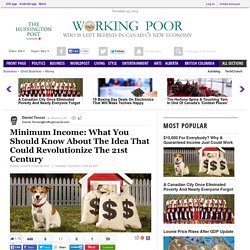
Europe’s Green Recovery by Connie Hedegaard. Exit from comment view mode.
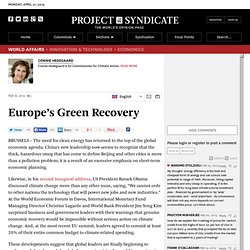
Click to hide this space BRUSSELS – The need for clean energy has returned to the top of the global economic agenda. China’s new leadership now seems to recognize that the thick, hazardous smog that has come to define Beijing and other cities is more than a pollution problem; it is a result of an excessive emphasis on short-term economic planning. Likewise, in his second inaugural address, US President Barack Obama discussed climate change more than any other issue, saying, “We cannot cede to other nations the technology that will power new jobs and new industries.” At the World Economic Forum in Davos, International Monetary Fund Managing Director Christine Lagarde and World Bank President Jim Yong Kim surprised business and government leaders with their warnings that genuine economic recovery would be impossible without serious action on climate change.
If Europe does not address these challenges, it risks being left behind. But Europe does have options. To Make Open Access Work, We Need to Do More Than Liberate Journal Articles. In the days since the tragedy of Aaron Swartz’s suicide, many academics have been posting open-access PDFs of their research.
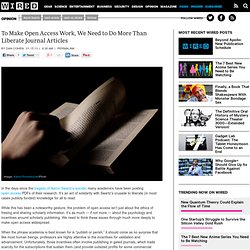
It’s an act of solidarity with Swartz’s crusade to liberate (in most cases publicly funded) knowledge for all to read. While this has been a noteworthy gesture, the problem of open access isn’t just about the ethics of freeing and sharing scholarly information. It’s as much — if not more — about the psychology and incentives around scholarly publishing.
A third industrial revolution. Watching Open Source Destroy Capitalism. Theft, or post-capitalism?

About twenty years ago one of my college housemates, Jerry, had an idea. “What if you could send music over the internet?” This was the age of 2400 baud modems that made crazy high pitched noised while they tried to connect to the internet. My 20 megabyte external hard drive for my MacPlus computer had set my parents back about five hundred bucks.
High quality digital audio files were about the same size as they are now (about ten megabytes per minute of audio). Manufacturing: The third industrial revolution. THE first industrial revolution began in Britain in the late 18th century, with the mechanisation of the textile industry.
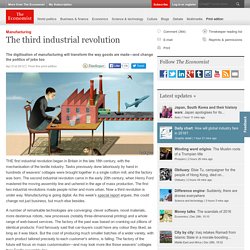
Tasks previously done laboriously by hand in hundreds of weavers' cottages were brought together in a single cotton mill, and the factory was born. The second industrial revolution came in the early 20th century, when Henry Ford mastered the moving assembly line and ushered in the age of mass production. The Third Industrial Revolution - a response to the Economist. The Third Revolution by nature of its high mechanisation and non-labour intensity means an ever larger proportion of the general public will be excluded from the production process or remunerated to ever lesser extents.
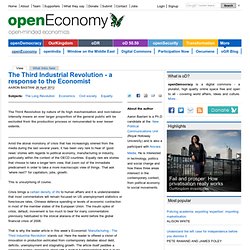
Amid the atonal monotony of crisis that has increasingly sirened from the media during the last several years, it has been very rare to hear of ‘good news’ stories with regards to political economy, manufacturing or industry, particularly within the context of the OECD countries. Equally rare are stories that choose to take a longer term view, that zoom out of the immediate predicament in order to take a more macroscopic view of things. That ask ‘where next?’ For capitalism, jobs, growth. An Abundant World. Do you remember the movie Spaceballs? There is a scene in which President Skroob, played by Mel Brooks, reaches into his desk drawer to open a can of clean “Perri-air” after assuring a news agency that “there is absolutely no air shortage whatsoever.”
While it may seem ludicrous that there would ever be a scarcity of clean air, living in polluted cities such as Beijing, Manila, or Los Angeles shows that clean air is not as abundant as it once was. For most of us, it is hard to imagine an abundant society. Abundance sounds nice. JEREMY RIFKIN.